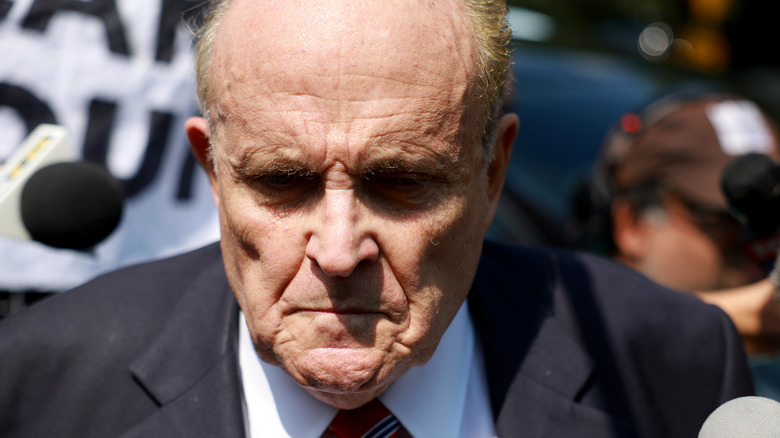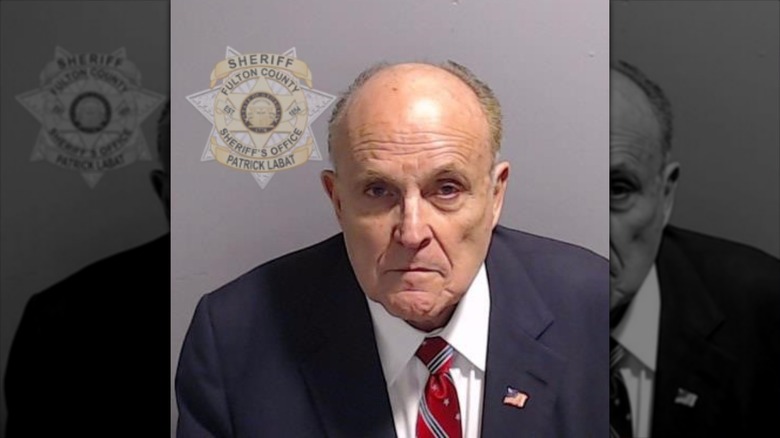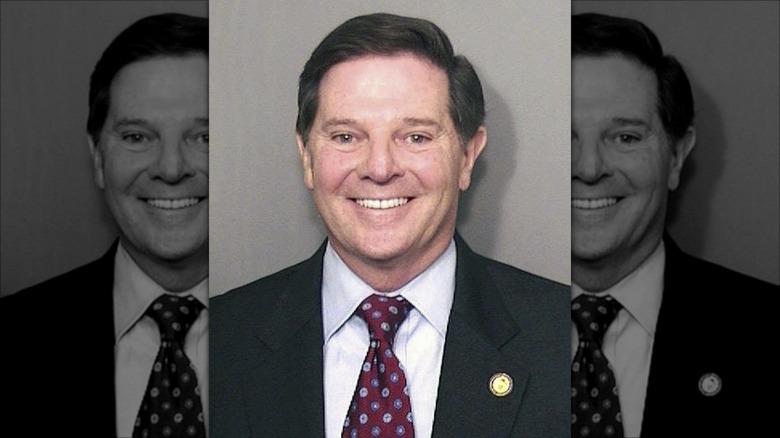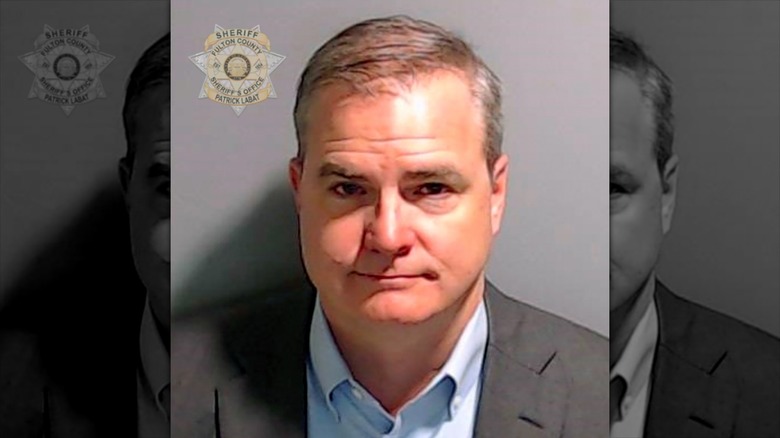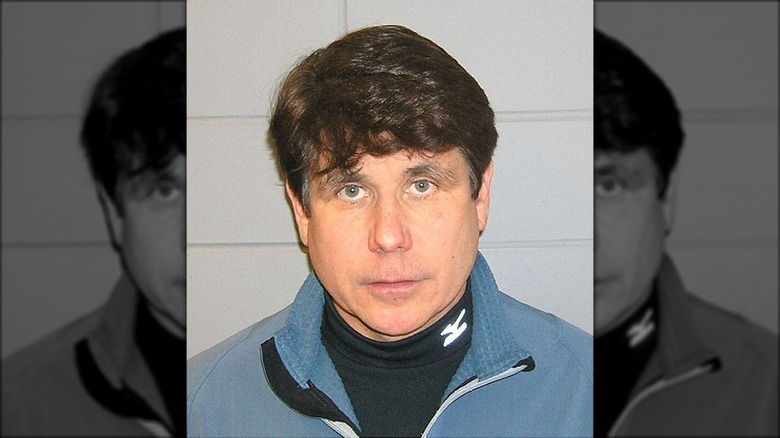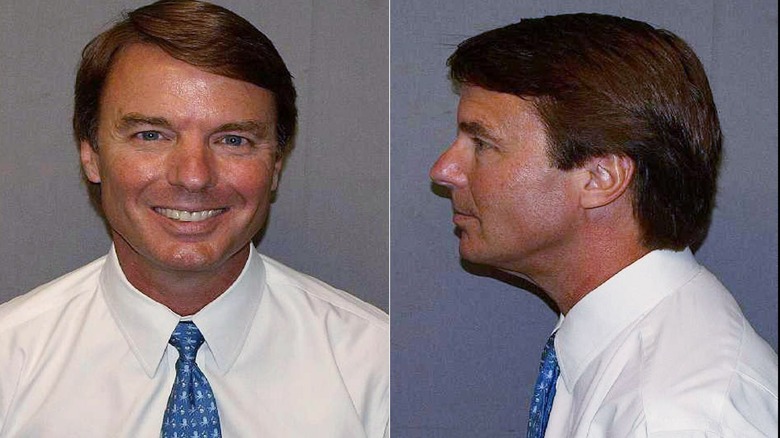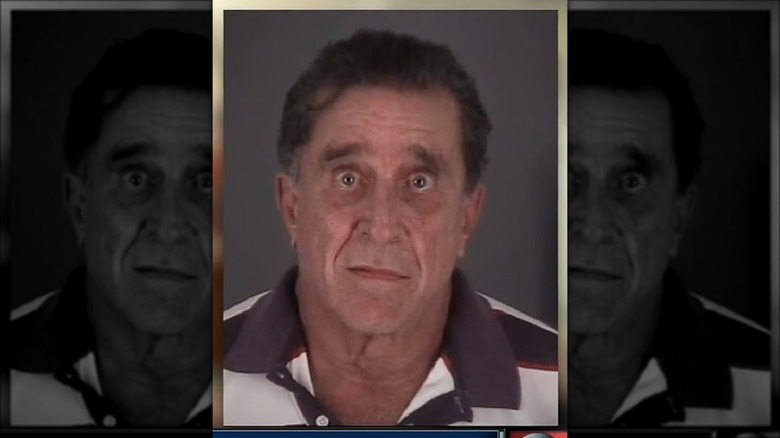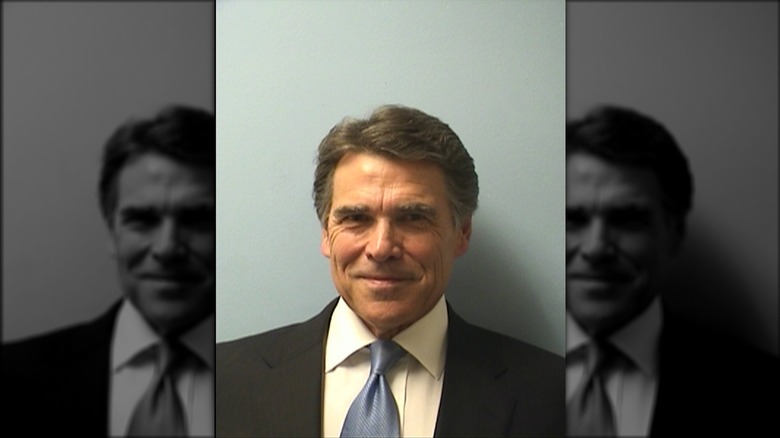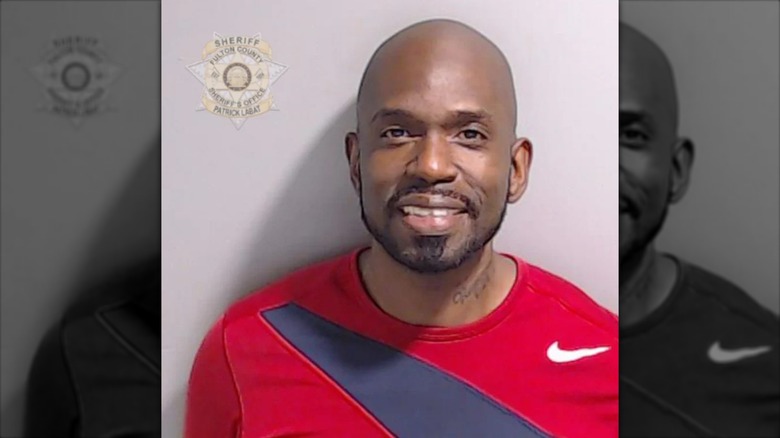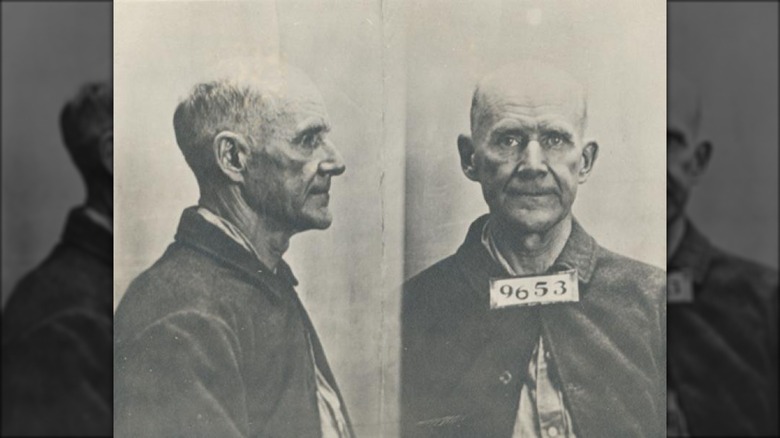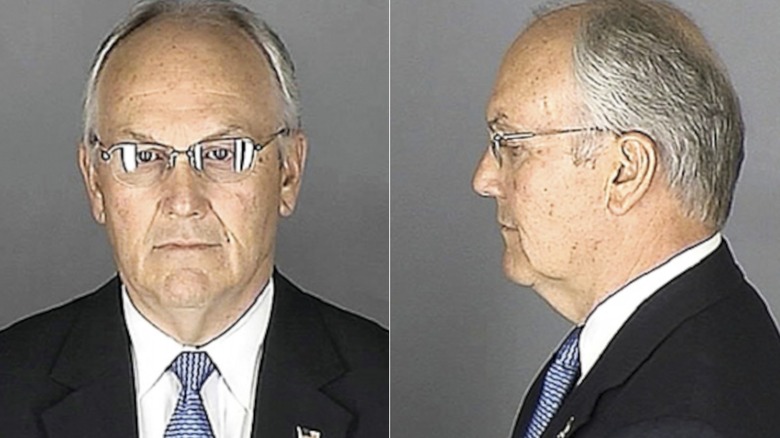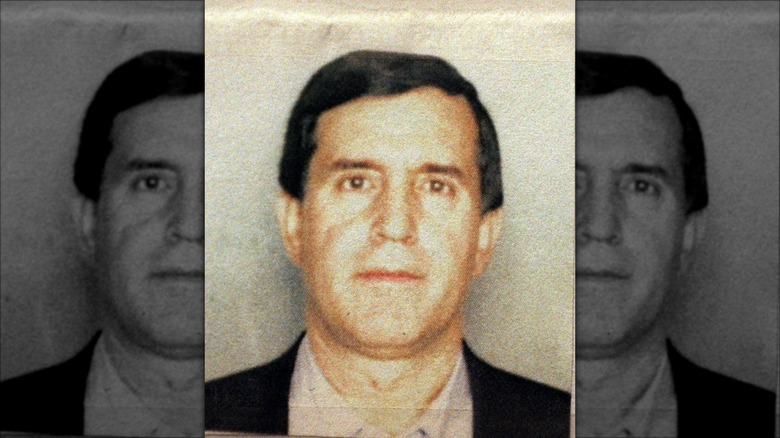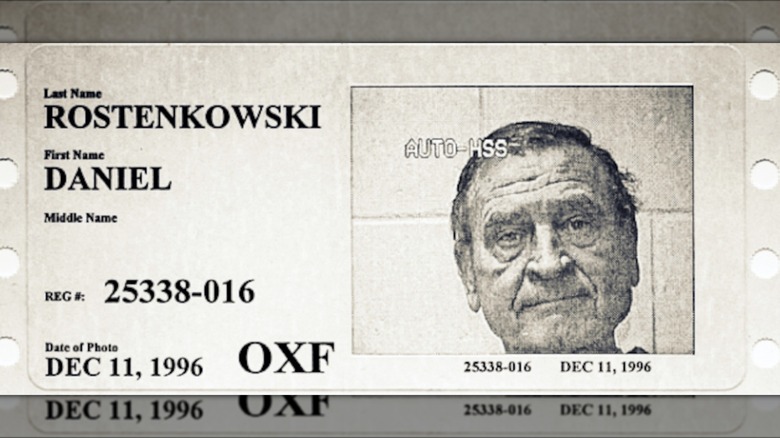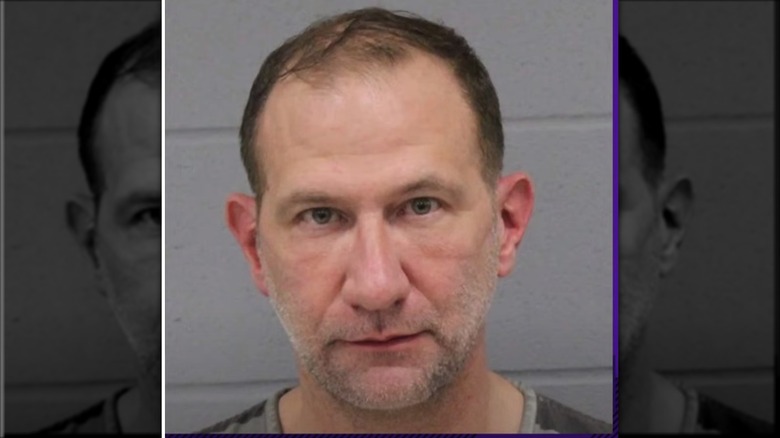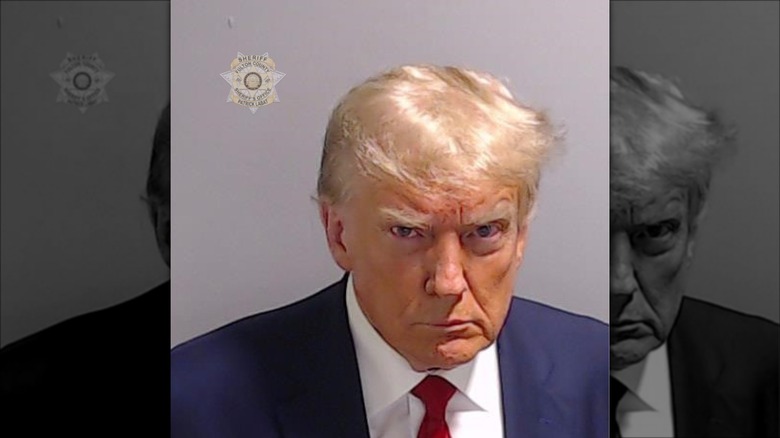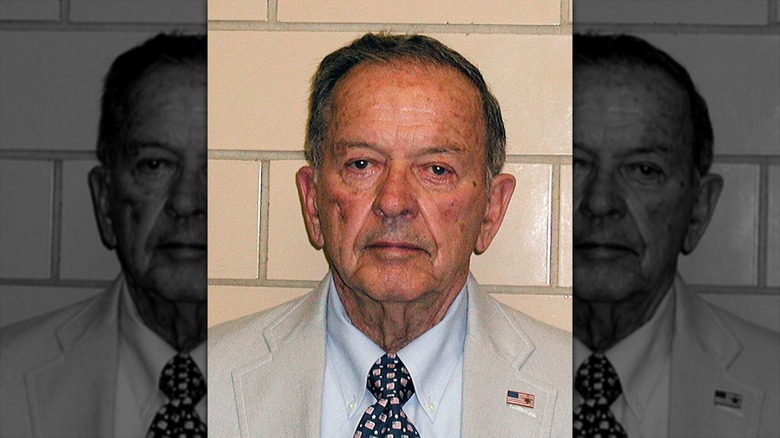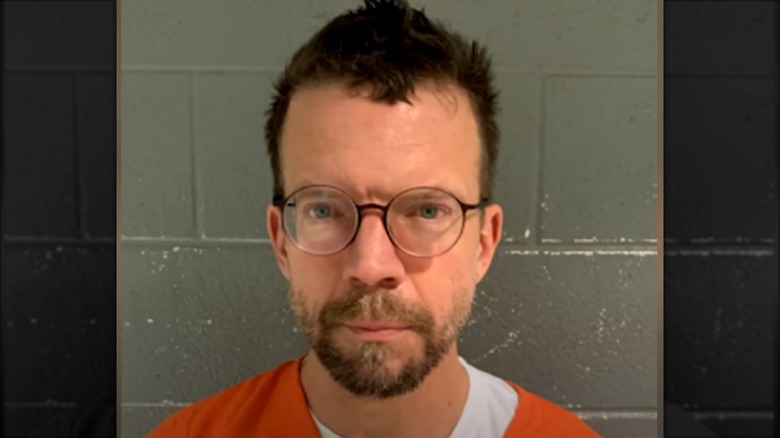16 Mugshots Of Politicians Who Were Arrested
In 2023, Donald Trump made history when he became the first former U.S. president indicted on criminal charges. When his mugshot was released, it was quickly plastered across international news. And it was a huge deal: Princeton University professor of American history Sean Wilentz told The New York Times, "It's dramatically unprecedented. Of all the millions, maybe billions of photos taken of Donald Trump, this could stand as the most famous. Or notorious."
Mugshots of ordinary folk might go viral for many different reasons, but one of the things that many of them have in common is that the subjects' expressions leave no doubt that they're somewhere they definitely do not want to be. Take a look through the mugshots of politicians, though, and not only is there a little more variety, but there's a surprising theme that often turns up: Many are smiling. Why?
Stu Loeser has worked with both Senate Majority Leader Chuck Schumer and New York's Mayor Michael Bloomberg in the always-tricky field of communications. He told Time that for a politician, a mugshot isn't just a mugshot — it's an opportunity to craft their image to reflect what they want the public to know. The first who seemed to realize that smiling was an option was Texas congressman Tom DeLay. "It was borderline shocking," Loeser said. "That hadn't really been done before. But if you don't think you're guilty, don't act like people who are guilty." Not all politicians have been quite so calculating during the booking process, though, as you'll see in this roundup of mugshots.
Rudy Giuliani
By the time Rudy Giuliani was arrested in 2023, he'd already had an incredibly long career. From his stint in the Justice Department to leading New York City through the terrorist attacks of 9/11, he'd been front and center for countless historic events. But when news broke that he was going to be indicted alongside former president Donald Trump, that was a historic event that NBC News says had many people stepping away from him. A former colleague and federal prosecutor was quoted as saying, "The current version of Rudy is not understandable to the people who thought they knew him when he was younger."
Among the many things on his resume was work done back in the 1980s, when he was instrumental in breaking up the so-called "Five Families" that ran New York City for the mafia. Among the biggest weapons in the then-federal prosecutor's arsenal were anti-racketeering laws, and when he was arrested along with 18 others, it was on accusations that he was in violation of Georgia's version of that very law.
Giuliani was charged under the Racketeering Influenced and Corrupt Organizations Act, with allegations that he had pushed election officials in several states to support claims of voter fraud, along with having a hand in news conferences that made similar claims. Giuliani maintained his innocence, issuing a statement that read, in part, "It's just the next chapter in a book of lies with the purpose of framing President Donald Trump and anyone willing to take on the ruling regime."
Tom DeLay
When House Majority Leader Tom DeLay was arrested in 2005, it's an understatement to say that the release of his mugshot was met with surprise. DeLay, dressed in a suit and tie with a House of Representatives pin clearly visible, was looking into the camera with a massive grin that looked as carefree as a vacation snap. His lawyer, Dick DeGuerin, explained the reasoning behind DeLay's choice of expressions to NBC News: "If you saw Congressman DeLay's mugshot, he was smiling. He's eager and he's ready to go."
It was the first time that a high-profile politician smiled in their mugshot, a carefully made decision to both stress innocence and prevent the photo from resurfacing in future political campaigns. It didn't exactly work: Fast forward to 2010 and 2011, and DeLay was found guilty and sentenced to three years in jail.
The charge? Conspiracy and money laundering. DeLay was accused of bypassing state prohibitions on using corporate donations for political campaigns, and overseeing the movement of $190,000 into Republican candidates' campaign funds. The New York Times reported that at his trial, there were accusations of a smear campaign mounted by a Democratic district attorney, and when the verdict was read, he said, "I never intended to break the law. I have always played by the rules. I cannot be remorseful for something I didn't think I did." In 2013, an appeals court agreed and overturned the conviction.
Shawn Still
Shawn Still was among the group of people indicted alongside former president Donald Trump in 2023. He was charged with two counts each of forgery in the first degree and false statements and writings, along with criminal attempt to commit filing false documents, impersonating a public officer, and violation of the Georgia RICO Act. A relative newcomer to government, he was elected to the Georgia Senate in 2022 and was accused of being one in a number of so-called "false electors."
And even The New York Times admits that the plan was incredibly confusing, calling it "the longest-running and most expansive of the multiple efforts by Mr. Trump and his allies to overturn the results of the 2020 election." In a nutshell, it was based on a 1960s-era solution to a dispute over ballot-counting in the Nixon vs. Kennedy election. In Trump's version, electors in seven key states would be recruited to sign documents supporting accusations of voter fraud and ultimately declaring a Trump victory. One of the states targeted was Still's Georgia.
According to Politico, he was among the first to go on record as saying that any questionable activities they participated in, they did so at Trump's direction. Still's attorney issued a statement that read, in part: "Mr. Still, as a presidential elector, was also acting at the direction of the incumbent president of the United States." Still and his co-defendants insisted they should therefore be immune from state prosecution.
Rod Blagojevich
In 2019, Rod Blagojevich was several years into a 14-year corruption sentence when then-President Donald Trump spoke up on his behalf, saying (via NBC News) that the conviction came "over a phone call where nothing happens. ... [H]e shouldn't have said what he said, but it was braggadocio, you would say." It wasn't the first time Trump and Blagojevich had been associated: Between his arrest and conviction, Blagojevich appeared on a season of "The Celebrity Apprentice."
The move was part of his image rehabilitation, and there were numerous charges to distract from. Elected as Illinois state governor in 2002, the former congressman was accused of kicking off what prosecutors called "a pattern of racketeering activity," culminating in an attempt to sell Barack Obama's Senate seat after his election to the presidency. Blagojevich was recorded during the aforementioned phone call, declaring that a seat in the U.S. Senate is "a f****** valuable thing. You just don't give it away for nothing."
After Blagojevich was arrested in 2008 and impeached in 2009, other incidents surfaced, leading to a series of felony charges that included racketeering, corruption, and extortion. Prosecutors argued that he had a pattern of delaying legislation until campaign contributions were made, including one instance where racing legislation was put on hold over a $100,000 campaign donation. Sentenced in 2011, Blagojevich spent eight years in jail before his sentence was commuted by Trump in 2020.
John Edwards
When law enforcement released the mugshot of former senator John Edwards in 2011, he was all smiles — so much so that Reuters reported on it with the headline, "Indicted John Edwards smiles in police mug shot." His arrest came on the heels of accusations that while he was chasing the 2008 Democratic presidential nomination, he had an affair — and a child — with one of his campaign workers, and used around $1 million in campaign funds to cover things up. At the time of his indictment, Edwards issued a statement saying, "There's no question that I've done wrong ... But I did not break the law, and I never, ever thought that I was breaking the law."
Edwards ended up going to trial on six charges of corruption, and in 2012, was found not guilty on one of those charges. On the others, the jury didn't reach a verdict, and it ended in a mistrial. With their announcement of the verdict, The New York Times noted that the death of Edwards' wife from cancer — which came not long before he acknowledged his illegitimate child — was a small part of the complex and often sordid story presented to the court.
Edwards wasn't re-tried, and he eventually returned to the courtroom as a partner in the Edwards Kirby law firm. He told WRAL News that his own experiences have made him sympathetic to clients: "Sometimes we can't make everything exactly right, but we can usually help people. It feels like you're actually able to do something with your life that means something."
Dale Massad
Dale Massad was a longtime doctor who gave up his license in 1992, after the death of a 3-year-old patient. Fast-forward to 2019, when a SWAT team was dispatched to the home of Massad, who had been elected mayor of Port Richey, Florida, in 2015. They were acting on a tip that he was illegally practicing medicine. According to The Washington Post, law enforcement showed up at his home at just before 5 a.m., announced themselves, and attempted to break down the front door. When they moved inside, Massad fired a gun twice. The shots didn't hit anyone but led to charges of attempted murder of a law enforcement officer.
The incident came a few months after Massad was arrested for domestic violence, and according to Pasco County Sheriff Chris Nocco, the arrest almost turned bloody when SWAT officers heard him make an ominous statement. "He's lucky he's not dead," Nocco said. "When somebody says, 'I'm not going back to jail,' that means it's either going to be a shootout, they're either going to flee, possibly suicide by cop."
That ultimately didn't happen, and the case never went to trial amid COVID lockdowns. In 2021, Massad — who said he had fired at the officers thinking that he was in danger — took a plea deal that would see him serve three years on the attempted murder charges.
Rick Perry
When then-Texas governor Rick Perry was brought up on charges of abuse of power in 2014, no arrest warrant was issued. Instead, Perry turned himself in, saying (via CBS), "I'm here today because I believe in the rule of law. And I'm here today because I did the right thing. I'm going to enter this courthouse with my head held high, knowing the actions that I took were not only lawful and legal, but right."
The actions in question centered around a Texas district attorney named Rosemary Lehmberg, who was also the head of an organization called the Public Integrity Unit. In 2013, she pleaded guilty to charges of driving while intoxicated, and when Perry called for her to resign, she refused. Afterward, he vetoed $7.5 million in funding that was designated to go to the unit, which was mainly in charge of investigating corruption charges — and, as The New York Times reported, was at the time investigating medical research grants given to those who were associated with Perry. Questions were raised, resulting in the filing of criminal charges against Perry.
Perry continued to maintain that everything he had done was above board, but the accusations were enough to derail his bid to secure the Republican presidential nomination. The case was finally dismissed in 2016. At the time, Lehmberg was still in office.
Khalid Kamau
In July 2023, WSB-TV released the mugshot of Khalid Kamau, the mayor of South Fulton, Georgia. At the time, they were only able to report that he had been arrested and charged with burglary and trespassing, although the details weren't immediately clear. Police reports later released by Fox 5 told two very different stories. According to authorities, a local homeowner had called 911 after being alerted that someone was in his home. That, he said, was Kamau, who attempted to leave when the owner approached.
Kamau, however, said that he had simply been on his way to the dog park when he decided to stop and look inside the home, as he was thinking about buying it. He also described the confrontation with the homeowner very differently, saying it quickly turned aggressive when the homeowner pulled his gun. Kamau later told reporters, "I just wanted to see the house. I do apologize to the owners. I thought it was abandoned."
Kamau was initially replaced by an acting mayor, but he returned to work by mid-July. The arrest wasn't the first of the mayor's troubles; in March, the city council had sued to have him removed from office, accusing him of a slew of offenses that included sharing private information with the public, making accusations of police corruption, and trying to force other officials to resign. As of this writing, it's still an active investigation.
Eugene Debs
The presidential election of 1920 had a very strange format: One candidate was running from the Atlanta Federal Penitentiary. Eugene Debs was running on the Socialist Party ticket, in spite of the fact that two years prior, he had been found guilty on charges of sedition and sentenced to three concurrent, 10-year sentences. It wasn't the first time he'd been in prison, either; years earlier, he had done time for his part in a massive strike against the Pullman Palace Car Company. His later actions were seen as even more dangerous.
Debs was a vocal opponent of World War I, and in the summer of 1918, he was speaking at an anti-war rally in Ohio. He delivered a message that included (via The Washington Post), "The working class who freely shed their blood and furnish the corpses, have never yet had a voice in either declaring war or making peace. It is the ruling class that invariably does both." When election time rolled around, it became clear that Debs wasn't alone in his thoughts, and he ended up getting 913,693 votes. As he expected, though, he got no electoral votes: He viewed his candidacy as a symbolic one that he hoped would encourage a prominent third party and raise awareness of the need for more workers' rights.
He was ultimately released by Warren G. Harding in 1921, and died five years later of complications from a heart condition. Interestingly, although he was released early, he was never pardoned in spite of protests, petitions, and support from stars like Mae West.
Larry Craig
In 2007, Idaho's senator Larry Craig was arrested after a now-infamous incident that took place in a bathroom at the Minneapolis-St. Paul International Airport. According to authorities — in particular, the undercover officer in the stall next to him — Craig had persisted in making sexual advances under the stall dividers. The officer — who was there investigating complaints of such activity — claimed Craig had tapped his foot and gestured under the divider to signal sexual intentions. Craig entered a guilty plea, but according to a statement, he would later come to regret it.
He said (via The New York Times), "At the time of this incident, I complained to the police that they were misconstruing my actions. I was not involved in any inappropriate conduct. I should have had the advice of counsel in resolving this matter. In hindsight, I should not have pled guilty. I was trying to handle this matter myself, quickly and expeditiously."
Craig was fined several hundred dollars and given a 10-day suspended jail sentence with a year's probation. Then, in 2014, he was back in the news when a federal judge ruled that Craig was responsible for a $242,000 repayment to the U.S. Treasury to replace campaign funds that had been used in an attempt to overturn the plea (via Politico).
Joe Carollo
In 2001, law enforcement responded to a 911 call made from the home of Miami mayor Joe Carollo. During the call, one of Carollo's daughters pleaded for help, saying (via The Associated Press), "Come help! My dad is hurting my mom." Officers responded, and Maria Ledon Carollo told them that he had thrown a terracotta tea canister at her, leaving a lump on her head.
That tea canister would become incredibly important in the case, with attorneys arguing over whether or not it even existed and ultimately, whether the story had been made up by police in order to justify the domestic abuse charge. Carollo told The Miami Herald (via ABC) that "I'm not guilty of any crime. What's been portrayed by police has just not been accurate." Police, however, stood by their story and charged Carollo, even though Maria — who had filed for a divorce the year prior — decided against pressing charges.
The case was ultimately dismissed after Carollo went through a program of anger management counseling. Carollo promised to run for public office again, and in 2017, was elected to the Miami Commission District 3 Seat. He did, however, find himself in court again on charges of weaponizing public policy to retaliate against businessmen who vocally supported his opponent in the race, and was ordered to pay $63 million in compensation.
Dan Rostenkowski
Dan Rostenkowski had an incredibly long career in politics, starting with heading right from college into the state legislature of Illinois. He was instrumental in — among other things — the creation of the Medicare system and the overhaul of Social Security, but in 1998, he commented in an interview that "I know that my obituary will say, 'Dan Rostenkowski, felon.'" The remark was, in fact, recounted in CBS's announcement of his death in 2010.
Rostenkowski had been in office for decades by the time he was brought up on 17 charges of the misuse of government funds, which included claims that some of the people on his congressional payroll provided personal services such as working for his family business or at his home. It was also alleged that he purchased gifts and personal vehicles with government funds, tasked employees with running personal errands, and took money from campaign funds.
After pleading guilty on two counts of mail fraud, he served a 15-month sentence and paid a $100,000 fine. He was officially pardoned by President Bill Clinton at the end of his time in office, and passed away at the age of 82 after a diagnosis of lung cancer.
Charles Schwertner
According to the 2023 arrest affidavit obtained by the Austin American-Statesman, law enforcement officers in Austin, Texas, said they had stopped a 2022 Cadillac that had been observed "swerving to the right and left and split[ing] the two lanes repeatedly." Behind the wheel was Senator Charles Schwertner, who was further described as having "a strong odor of alcoholic beverage on his breath." The Texas senator was arrested, booked, and later released on bail.
It was later reported that the charges had been dropped, with prosecutors saying, "We determined there was not sufficient evidence to prove guilt beyond a reasonable doubt." They also noted that — like others facing first-time DWI charges — Schwertner had agreed to a period of counseling and monitoring. On his release, he also issued a statement to reporters (via Fox 7): "I'm deeply sorry, apologetic to my citizens and my family. I made a mistake."
Donald Trump
The release of former president Donald Trump's dramatically scowling mugshot comes with a bit of a history lesson. The long-standing point of a mugshot is that a person's appearance is on record should any other crimes be associated with them, but Trump is so universally recognizable that other law enforcement agencies that had leveled charges against him decided to skip the mugshot. That, says The New York Times, is the reason that no mugshots were taken prior to the one from Fulton County, Georgia.
Georgia state law says that no matter how famous the person, a mugshot has to be taken when felony charges are on the table — meaning that Trump was given a real mugshot to go along with the fake ones that surfaced as a part of his campaign merch.
So, what are the charges associated with this one? The Washington Post says that the laws he's being charged under were originally written to give law enforcement a tool to use against criminal enterprises like those associated with the mob, which basically allowed for a whole bunch of crimes to be included in one: racketeering. Prosecutors say that the charges filed against Trump involve a sprawling plan to overturn the result of the 2020 presidential election, and if found guilty, it could mean 20 years in jail.
Ted Stevens
In 2008, Alaska senator Ted Stevens was brought up on charges of accepting high-value gifts — including a Land Rover and home renovations — from an oil company, then failing to disclose those gifts. According to The New York Times, Stevens immediately issued a statement that read, "I am innocent of these charges and intend to prove that." Stevens was convicted on those charges, but that definitely wasn't the end of the story.
Part of the evidence against him was testimony from VECO Corporation executive Bill Allen, and it wasn't until 2009 that an investigation into the trial turned up evidence that the prosecution had not only allowed Allen to give a testimony on the stand that contradicted other versions of the story, but had overlooked and ultimately withheld other evidence in the case as well. The case was dismissed in 2009, and by 2012, further investigation resulted in a report that led to the prosecutors being suspended without pay: one for 40 days, and another for 15 days. (A third had already died by suicide.) According to The New York Times, the official ruling was that the oversights had come as a result of "poor judgment" instead of malicious misconduct.
Stevens didn't see the outcome of the investigation into the team that prosecuted his case: He was killed in a 2010 plane crash.
Patrick Wojahn
Patrick Wojahn was elected mayor of College Park, Maryland, in 2015, and served as such until he handed in a 2023 resignation letter saying (via The New York Times) that he was "stepping away to deal with [his] own mental health." The following day, he was arrested on charges of possessing and distributing child sexual abuse imagery.
An investigation had been opened in early 2023 when law enforcement was informed of images that had been found on the Kik messaging and social media app, in an account that was linked to Wojahn. After his electronics were seized and more than 1,500 videos were discovered, he was charged with 140 counts of crimes related to the possession and distribution of the images. After pleading guilty, he accepted a deal that included a 30-year prison sentence, and after his release, 25 years of registering as a sex offender.
According to The Washington Post, Wojahn "advised that he has viewed and possessed files depicting child pornography," and the volume of materials made it one of the largest such cases Prince George County had ever seen. Wojahn's official statement promised, "I have cooperated fully, and will continue to cooperate, with law enforcement."
If you or anyone you know is dealing with domestic abuse or may be the victim of child abuse, contact the relevant resources below:
- National Domestic Violence Hotline at 1−800−799−7233. You can also find more information, resources, and support at their website.
- Childhelp National Child Abuse Hotline at 1-800-4-A-Child (1-800-422-4453) or contact their live chat services.
